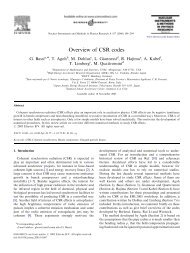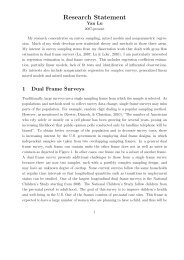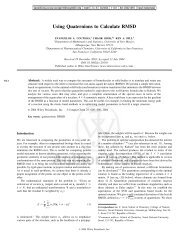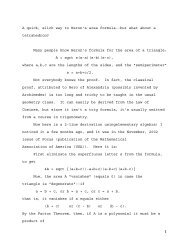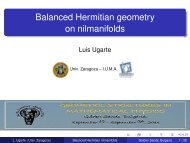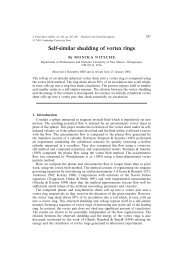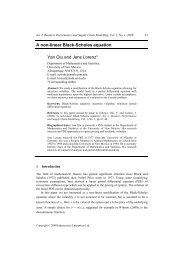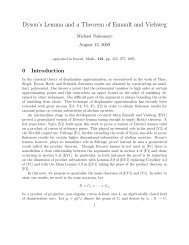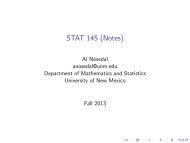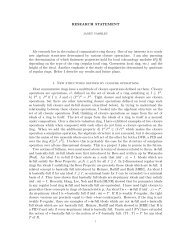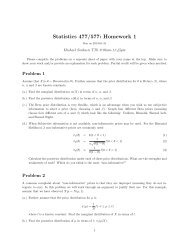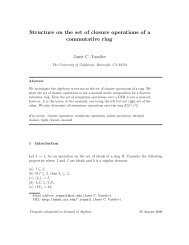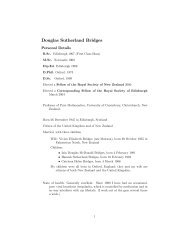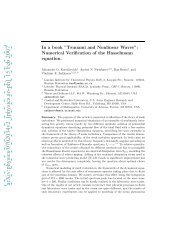OEO Office of Equal Opportunity - Department of Mathematics and ...
OEO Office of Equal Opportunity - Department of Mathematics and ...
OEO Office of Equal Opportunity - Department of Mathematics and ...
Create successful ePaper yourself
Turn your PDF publications into a flip-book with our unique Google optimized e-Paper software.
230 ARTS AND SCIENCES<br />
Timothy Graham, Institute for Medieval Studies<br />
Kristine Grimsrud, Economics<br />
Gary Harrison, English<br />
Gail Houston, English<br />
Brent Kalar, Philosophy<br />
Martin Klebes, Foreign Languages <strong>and</strong> Literatures<br />
Natasha Kolchevska, Foreign Languages <strong>and</strong> Literatures<br />
Byron Lindsey, Foreign Languages <strong>and</strong> Literatures<br />
Joseph McAlhany, Foreign Languages <strong>and</strong> Literatures<br />
Carmen Nocentelli, Foreign Languages <strong>and</strong> Literatures<br />
Anita Obermeier, Foreign Languages <strong>and</strong> Literatures<br />
Marina Peters-Newell, Foreign Languages <strong>and</strong> Literatures<br />
Walter Putnam, Foreign Languages <strong>and</strong> Literatures<br />
Richard Robbins, History<br />
Jay Rubenstein, History<br />
Enrique Sanabria, History<br />
Christine Sauer, Economics<br />
Katja Schroeter, Foreign Languages <strong>and</strong> Literatures<br />
Jane Slaughter, History<br />
Warren Smith, Foreign Languages <strong>and</strong> Literatures<br />
Jake Spidel, History<br />
Charlie Steen, History<br />
Lawrence Straus, Anthropology<br />
Neddy Vigil, Spanish <strong>and</strong> Portuguese<br />
Iain Thomson, Philosophy<br />
Carolyn Woodward, English<br />
Major Study Requirements<br />
The interdisciplinary European Studies Major requires 36<br />
hours <strong>of</strong> work in approved courses from a very broad range<br />
<strong>of</strong> departmental <strong>of</strong>ferings (list available on Web site or in<br />
European Studies <strong>of</strong>fice). All students must take 12 hours <strong>of</strong><br />
courses in a European language other than English or the<br />
equivalent (testing out or taking a 300 level or above course in<br />
the language). Students are further required to take a minimum<br />
<strong>of</strong> 3 hours in courses with predominantly European content<br />
<strong>and</strong> focus from each <strong>of</strong> the following four general areas:<br />
1) Fine Arts (Art/Art History, Dance, Media Arts, Music,<br />
Theatre)<br />
2) History<br />
3) Literature <strong>and</strong> Philosophy (English, Comparative<br />
Literature, Foreign Languages <strong>and</strong> Literatures,<br />
Philosophy)<br />
4) Social Science (Anthropology, Economics, Geography,<br />
Political Science, Sociology)<br />
In addition to the distribution requirements outlined above,<br />
students must take the interdisciplinary “European Studies<br />
Seminar” (3 hours), plus an additional 9 hours from the<br />
courses in the approved European Studies catalog (list available<br />
on Web site or in European Studies <strong>of</strong>fice).<br />
The non-language courses (24 hours) must meet the following<br />
guidelines:<br />
No more than 6 hours below the 300 level;<br />
No more than 12 hours in any one department; <strong>and</strong><br />
No more than 3 hours in undergraduate readings or<br />
individual studies courses.<br />
Students are encouraged, where possible, to construct with<br />
the advice <strong>of</strong> the European Studies Director a “disciplinary<br />
focus” tied to the departmental discipline in which they take<br />
the majority <strong>of</strong> their courses.<br />
<strong>Department</strong>al Honors<br />
Students who seek honors in European Studies should contact<br />
the Director. Graduating with Honors requires a minimum grade<br />
point average <strong>of</strong> 3.5 <strong>and</strong> the writing <strong>of</strong> an Honors Thesis.<br />
Minor Study Requirements<br />
The interdisciplinary European Studies minor requires 30<br />
hours <strong>of</strong> work in approved courses from a very broad range<br />
<strong>of</strong> departmental <strong>of</strong>ferings (list available on Web site or in<br />
European Studies <strong>of</strong>fice). All students must take 12 hours <strong>of</strong><br />
courses in a European language other than English or the<br />
equivalent (testing out or taking a 300 level or above course in<br />
the language). Students are further required to take a minimum<br />
<strong>of</strong> 3 hours in courses with predominantly European content<br />
<strong>and</strong> focus from three <strong>of</strong> the following four general areas:<br />
1) Fine Arts (Art/Art History, Dance, Media Arts, Music,<br />
Theatre)<br />
2) History<br />
3) Literature <strong>and</strong> Philosophy (English, Comparative<br />
Literature, Foreign Languages <strong>and</strong> Literatures,<br />
Philosophy)<br />
4) Social Science (Anthropology, Economics, Geography,<br />
Political Science, Sociology)<br />
In addition to the distribution requirements outlined above,<br />
students must take an additional 9 hours from the courses in<br />
the approved European Studies catalog (list available on Web<br />
site or in European Studies <strong>of</strong>fice).<br />
The non-language courses must meet the following guidelines:<br />
No more than 6 hours below the 300 level;<br />
No more than 9 hours in any one department; <strong>and</strong><br />
No more than 3 hours in undergraduate readings or individual<br />
studies courses.<br />
NOTE: The list <strong>of</strong> approved courses, or European<br />
Studies catalog, is a compilation <strong>of</strong> all undergraduate<br />
courses <strong>of</strong>fered by The University <strong>of</strong> New Mexico which<br />
are devoted mostly to European orientations. These<br />
include, in addition to those <strong>of</strong>fered in the College<br />
<strong>of</strong> Arts <strong>and</strong> Sciences, certain courses in the College<br />
<strong>of</strong> Fine Arts <strong>and</strong> the Schools <strong>of</strong> Architecture <strong>and</strong><br />
Planning, Management <strong>and</strong> Law. The list is available<br />
on the European Studies Web site <strong>and</strong> in the European<br />
Studies <strong>of</strong>fice. The list is not necessarily complete since<br />
new courses are added every year, <strong>and</strong> students are<br />
therefore encouraged to ask about courses not found<br />
on the list that appear to satisfy the requirements.<br />
Russian Studies<br />
Richard Robbins, Chairperson (2002–2003)<br />
Mesa Vista Hall 2094<br />
MSC06 3760<br />
1 University <strong>of</strong> New Mexico<br />
Albuquerque, NM 87131-0001<br />
(505) 277-2451, 277-4428<br />
For general current information about the program contact<br />
the department <strong>of</strong> History; for advisement <strong>and</strong> pertinent information<br />
about the individual fields <strong>of</strong> specialization, contact<br />
individual faculty members <strong>of</strong> the committee.<br />
Committee in Charge<br />
Melissa Bokovoy, History<br />
Gregory Gleason, Political Science<br />
Natasha Kolchevska, Foreign Languages <strong>and</strong> Literatures<br />
Byron Lindsey, Foreign Languages <strong>and</strong> Literatures<br />
Carole Nagengast, Anthropology<br />
Richard Robbins, History<br />
Introduction<br />
The combined major in Russian Studies is administered by<br />
the interdepartmental committee listed above. The goal <strong>of</strong><br />
the program is to provide the student with a broad knowledge<br />
<strong>of</strong> modern Russia <strong>and</strong> Eastern Europe through the study<br />
<strong>of</strong> humanities, language, literature <strong>and</strong> the social sciences.<br />
Study <strong>of</strong> the Russian language beyond a reading knowledge<br />
is required. The major does not require a minor for graduation,<br />
though one is <strong>of</strong>fered.<br />
UNM CATALOG 2006–2007 Symbols, page 611.



